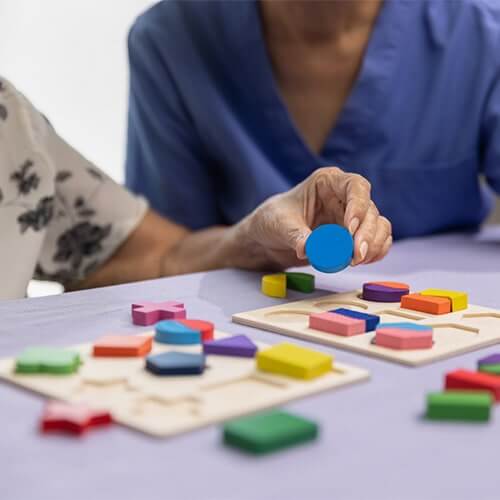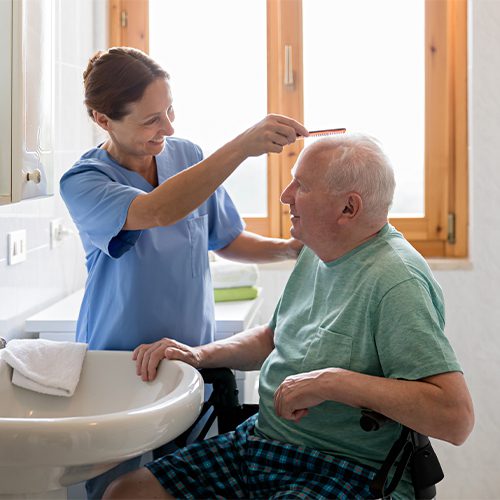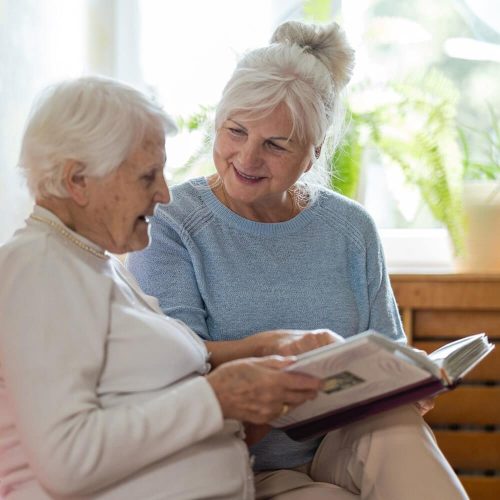Why Stimulus and Contact Are Vital for People with Dementia

Have you ever seen a loved one light up at a favourite song or the scent of home? For someone living with dementia, these sensory moments can cut through confusion and create calm, even joy. They’re small, but deeply meaningful.
We understand how hard it is when every day feels like guesswork – when you’re trying your best but still wondering if it’s enough. That’s why stimulus and contact in dementia care matter so much. From gentle touch to music and memory, these human moments make a difference.
In this blog, we at LuxuryCare explore dementia stimulation activities and care that support emotional wellbeing, ease agitation, and foster connection.
With nearly one million people in the UK living with dementia, research shows that person-centred, sensory-based care isn’t just comforting – it can improve quality of life. One UK trial found that tailored activity plans led to reduced distress and greater engagement among residents.
So how does it work in practice, and how can you bring more of it into daily life?
What is Stimulus in Dementia Care?
When we speak about stimulus in dementia care, we’re referring to anything that gently engages the senses, emotions, or mind, offering moments of comfort, curiosity, or connection. This might include sights, sounds, touch, scents, tastes, or activities that spark interest.
Sensory stimulation for elderly people might be as simple as soft lighting, familiar music, textured fabrics, the scent of baking bread, or a jigsaw puzzle. Even as dementia progresses, the brain can still respond to sensory input, especially when it’s tied to memory or emotion.
Worth noting that there are two kinds of stimulation, starting with passive, which is where the individual absorbs the experience (like listening to music). The second type is active, where they engage with it (like painting or gardening).
Both are beneficial, and both offer a way to reconnect with the world around them, even as cognitive function changes.
Now that we understand stimulus, let’s explore the other essential element, and that’s human contact.


How Human Contact Supports Emotional Wellbeing
Human connection in dementia care is powerful. In fact, it goes beyond words, as it lives in eye contact, warm smiles, gentle hands, and the tone of your voice. For someone who may not recognise your face, your presence still offers a sense of safety.
Think of brushing your loved one’s hair, holding their hand during a quiet moment, or sharing a knowing look. These acts build trust and familiarity and can ground someone who feels adrift in confusion.
Emotional support for dementia patients is not always about conversation, as it’s also about showing up, being present, and bringing comfort through consistency and care. A person may not remember your name, but they will feel your warmth, and they will feel your kindness. That feeling of being seen and valued stays with them, even if the memory does not.
Key Benefits of Stimulus and Contact for People with Dementia
Incorporating stimulus and contact in dementia care through music, sensory experiences, and person-led engagement isn’t just comforting – it’s clinically proven to make a difference. Evidence shows that personalised activities can lift mood, reduce distress, and support emotional resilience in people living with dementia.
For example:
- Active music therapy with singing reduced depressive symptoms and agitation significantly (Polden 2025)
- Cognitive stimulation techniques led to modest but meaningful improvements in cognition, helping delay memory decline (Woods 2023)
- Music-based interventions improved sleep quality by easing anxiety and enhancing emotional regulation (Gou 2025)
- Research has found that ten minutes of social interaction a day helps improve wellbeing for people with dementia in care homes (Alzheimer’s Society 2018)
These small, intentional acts, done consistently, can help improve a person’s quality of life. Dementia care is most effective when emotional safety and connection are prioritised, creating a calmer, more engaging daily experience for everyone involved.
Simple Ways Families Can Provide Stimulus and Contact
What’s great is that you don’t need clinical training to connect with your loved one. In fact, some of the most effective dementia stimulation activities are simple, heartfelt moments shared consistently.
Simply try these easy, meaningful approaches:
- Listen to favourite music together
- Use essential oils or familiar scents like rose, citrus, or lavender
- Offer a light hand massage or gently apply hand cream
- Look through old photo albums and reminisce
- Read a beloved book or poem aloud
- Play tactile games or handle soft-textured objects
- Share a warm drink and a quiet conversation
When it comes to dementia care tips for families, consistency matters more than complexity. Even a few minutes each day can offer comfort and stability.
How Our Carers at LuxuryCare Bring These Practices to Life
At LuxuryCare, we’ve spent 25 years building a trusted presence in Bournemouth and Poole, delivering care with heart and expertise. Every day, our team integrates stimulus and contact in dementia care through personalised routines designed to suit each resident’s needs.
Our homes offer sensory therapy for Alzheimer’s along with all other diseases that fall under the dementia umbrella. These therapies include music therapy, memory boxes, reminiscence spaces, and dedicated sensory rooms. Carers are trained in person-centred dementia support, placing individual preferences, routines, and histories at the heart of care.
LuxuryCare is CQC-rated ‘Outstanding’ in dementia support, and our approach is guided by empathy, clinical knowledge, and a deep respect for every individual.


What You Can Do Today to Support Your Loved One
You don’t need to overhaul everything, as the most important thing is to begin, even with small steps.
Here are a few realistic ideas you can try today:
- Speak gently, make eye contact, and hold their hand
- Play music from their youth or a song they loved
- Use scents like lavender or rosemary to create calm
- Bring a pet for a short visit or cuddle session
- Sit quietly together and simply share the moment
Sensory stimulation for elderly people isn’t about performance; it’s about presence. You don’t have to do everything at once, as small gestures build meaningful connection. Over time, these acts become the rhythm of reassurance your loved one can rely on.
Final Thoughts: Why Every Moment of Connection Matters
In dementia care, it’s the smallest moments that leave the deepest imprint. A soft voice, a familiar scent, a shared glance; they mean more than words. If you’re feeling unsure, you’re not alone. We’re here to help.
Family involvement in dementia care makes a world of difference, but it doesn’t have to be overwhelming. Contact LuxuryCare to see how we support every resident with heart-led care. Our six modern care homes offer personalised dementia support, and our fully certified team is always here to talk.
Call us on 01202 037373 or use our contact form to speak to someone who understands.














